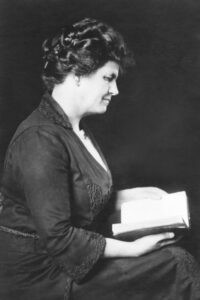
A Voice in the Wilderness
There did not seem to be any building on that side of the track. It was probably on the other side, but she was standing too near the cars to see. She tried to move back to look, but the ground sloped, and she slipped and fell in the cinders, bruising her knee and cutting her wrist. In a sudden panic, she arose. She would get back on the train, no matter what the consequences. They had no right to put her out here, away from the station, at night, in a strange country.
If the train started before she could find the conductor, she would tell him he must back it up again and let her off. He certainly could not expect her to get out like this. She lifted the heavy suitcase, the high step even farther from the ground than when she came down because her fall had loosened some of the earth and caused it to slide away from the track. Then, reaching to the rail of the step, she tried to pull herself up, but as she did so, the engine gave a long snort, and the whole train, as if it were in league against her, lurched forward crazily, shaking off her hold.
She slipped to her knees again, the suit-case toppled from the lower step, descending upon her, and together they slid and rolled down the short bank, while the train, like an irresponsible nurse who had slapped her charge and left it to its fate, ran giddily off into the night. The horror of being deserted helped the girl to rise despite bruises and shock. She lifted imploring hands to the unresponsive cars as they hurried by her—one, two, three, with bright windows, each showing a passenger, comfortable and safe inside, unconscious of her need. After a moment of useless screaming, running, trying to attract someone’s attention, and a sickening sense of terror and failure, the last car slatted itself past with a mocking clatter as if it enjoyed her discomfort.
Read or download Book
Grace Livingston Hill
Grace Livingston Hill was born in Wellsville, New York, to Marcia Macdonald Livingston and her husband, Presbyterian minister Rev. Charles Montgomery Livingston.
Biography.
Both were writers, as was her aunt, Isabella Macdonald Alden, who wrote under the pseudonym “Pansy.” Hill’s writing career began as a child in the 1870s, writing short stories for her aunt’s weekly children’s publication, The Pansy. Her first story printed in book form was The Esselstynes, which was published in 1877 as part of the “Mother’s Boys and Girls Library” by D. Lothrop & Company.
A Chautauqua Idyl, her first book as a young adult, was written in 1887 to earn enough money for a family trip from her Florida home to the summer Chautauqua gathering at Chautauqua, New York. This illustrated allegory of a Chautauqua gathering held by the flowers, trees, and animals was published in time to be offered for sale that summer and brought enough earnings to take the family there.
Several books written in collaboration with her family followed in the early 1890s, as well as her only children’s book, A Little Servant. Lack of funds was a frequent motivator, particularly after the death of her first husband left her with two small children and no income other than that from her writing. After the death of Hill’s father, less than a year later, her mother came to live with her. This prompted Hill to write more frequently. She continued to write to support her children and mother during and after her failed ten-year marriage to her second husband, Flavius Josephus Lutz, a church organist 15 years her junior.
She stopped using the Lutz surname after they parted ways in May 1914. Although many of her earlier novels were explicitly intended to proselytize, Hill’s publishers frequently removed overt references to religious themes. After her publishers realized the popularity of her books, references to religious topics were allowed to remain. However, she later modified her writing style to appeal to a more secular audience. The last Grace Livingston Hill book, Mary Arden, was finished by her daughter, Ruth Hill Munce, writing under the name of Ruth Livingston Hill, and published in 1948.






